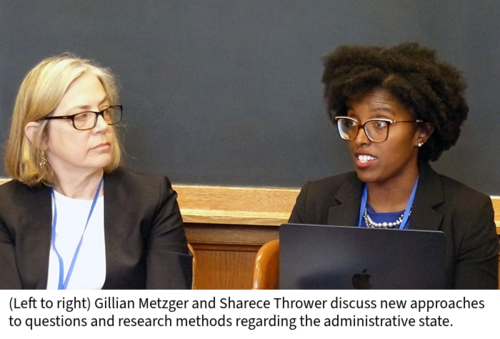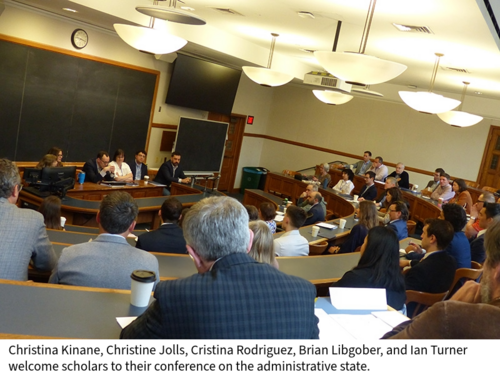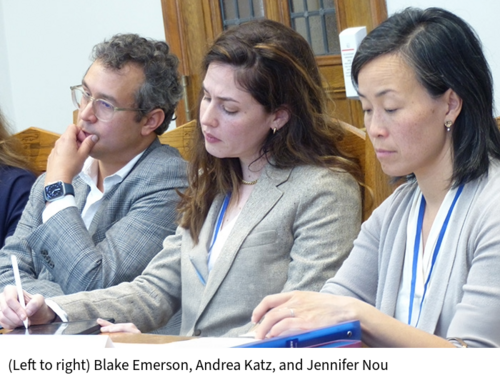Baby on Board: Scholars Confront the Fragility of the Administrative State Amid Political and Judicial Upheaval

In the 1960s and 70s, you could stow your baby in a hammock strung across the back of your car. One model, the Lull-A-Baby Car Hammock was advertised as “the safest, most comfortable car bed ever made.”
Perhaps needless to say, this method for transporting infants risked severe injury and death. Eventually, all 50 states passed laws requiring infant car seats proven safe through rigorous testing. And today, the U.S. Consumer Product Safety Commission oversees the standards and regulations for such products.
“The status quo we have is precisely because government has solved problems,” Christina Kinane said, emphasizing that the absence of constant, visible crises such as unsafe streets, collapsing buildings, and rampant disease can be mistaken for government irrelevance and not its quiet effectiveness. “The generation that lived through the last time these problems happened widely — they’re gone.”
At a conference at Yale last month, legal scholars and political scientists discussed how to best investigate the rapidly changing nature of the collection of state and federal agencies known as the administrative state.
Kinane, an ISPS faculty fellow, assistant professor of political science, and one of the conference’s organizers, argued for the importance of teaching students about the successes of government regarding safety, infrastructure, and public well-being. She compared the country to a house that society has inherited.
“We’ve forgotten that the reason why we don’t have sewage on the floor and water coming out of the walls is because the plumbing is working,” she said. “If people begin to take sledgehammers to the administrative state without understanding its function, they risk destroying the very systems that keep society safe and functional.”
Kinane organized the conference with Nicholas Parillo, William K. Townsend Professor of Law and professor of history; Christine Jolls, Gordon Bradford Tweedy Professor of Law and Organization; Brian Libgober, assistant professor of political science and law at Northwestern University; Cristina Rodríguez, Leighton Homer Surbeck Professor of Law at Yale Law School; and Ian Turner, ISPS faculty fellow and assistant professor of political science.
Sponsored by the Institution for Social and Policy Studies and Yale Law School, the conference featured new research on the relationships between federal agencies and the president, the legislature, and stakeholders; judicial review of agency actions; and agency personnel.

In one panel session, John Dearborn, assistant professor of political science at Vanderbilt University, explored an important moment in the rise of the unitary executive theory. He focused on the Carter administration’s reorganization effort to centralize civil rights enforcement under the Equal Employment Opportunity Commission and how the Reagan administration later built on this precedent to assert stronger executive authority over that agency.
Andrea Katz, associate professor of law at Washington University School of Law in St. Louis, analyzed how the current U.S. Supreme Court has redefined presidential power by discovering unwritten constitutional principles, including a presidential immunity to criminal prosecution and the constriction of agency autonomy. She likened the trend to the period of judicial activism known as the Lochner era.
“Presidential power is ripe for Lochnerizing,” Katz said. “A method that is essentially impossible to check because it is not rule-based — tantamount to judicial divination.”
Jennifer Nou, the Ruth Wyatt Rosenson Professor of Law at the University of Chicago Law School, drew on her experience in the Biden administration to examine institutional frictions within units of the Executive Office of the President. She argued that such tensions reflect structural differences in which career staff and statutory mandates create soft-power counterweights to presidential control.
“We need to talk more about institutions — not just personalities — to have a proper study of the presidency,” Nou said.
Another session explored how to evolve research methods when investigating the changing dynamics around the administrative state.
Nolan McCarty, Susan Dod Brown Professor of Politics and Public Affairs at Princeton University, warned against data-first research without theoretical grounding. He said the abundance of data has led to undisciplined exploration. For example, he criticized polling aggregators for combining high-quality data with low-quality data, falsely reducing margins of error.
“Data scarcity can be a good disciplining device in political science,” he said.
A concluding session invited participants to chart the future of research into administrative law as a more productive marriage between legal scholars and political scientists amid the mass layoffs and agency restructuring currently led by the Trump administration.

Anne Joseph O’Connell, Adelbert H. Sweet Professor of Law at Stanford University, stressed the need to conduct more actionable, policy-relevant research.
“We’ve had this moment of destruction, and so how do we think in really big ways about rebuilding capacity when we might have the chance to rebuild?” she said. “Maybe we need to move from papers premised on ‘Hey, look at that!’ to those that say ‘Hey, let us help.’”
Devin Judge-Lord, assistant professor at the University of Michigan’s Gerald R. Ford School of Public Policy, discussed his ongoing efforts to mirror and preserve government data, particularly from regulatory websites like Regulations.gov, in response to concerns about data being removed or altered.
Daniel Carpenter, the Allie S. Freed Professor of Government and chair of the Department of Government at Harvard University, described a “collective failure” in American-focused political science and law to address the rise in authoritarianism in administrative governance. He urged scholars to adopt a more global and historical perspective, including the study of bureaucratic strategies in places like Hungary and Argentina and in the United States under federal American Indian policy and when Jim Crow laws dominated.
“If I look at the American political science literature, I’m not going to find the word ‘authoritarianism’ very commonly represented,” he said. “We need to think about empire and colonialism and the role of bureaucrats in those spaces.”
Jon Rogowski, a professor of political science at the University of Chicago, emphasized the need to better communicate the value of the administrative state to the public.
“We need to convince others why they should care about the things whose importance seems obvious to us,” he said.
Pamela McCann, an associate professor at the University of Southern California Sol Price School of Public Policy, and Noah Rosenblum, associate professor of law at New York University School of Law, cautioned against conflating defense of bureaucracy with uncritical support of the New Deal order, urging scholars to acknowledge legitimate critiques.
Kinane agreed, encouraging scholars to engage with students and the public, continue asking hard questions, and build a new generation of researchers committed to understanding and improving the administrative state.
“The administrative state today is more capable, professional, and responsive than ever —but it is still imperfect and in need of reform,” she said. “Both things can be true. If we want the public to see the good in government, our research needs to examine not just what’s broken, but what’s working. And what’s possible.”